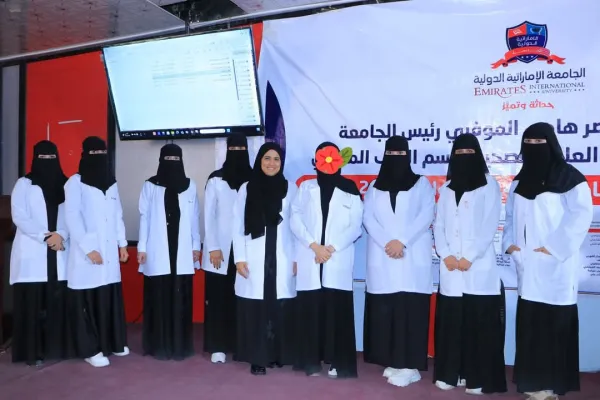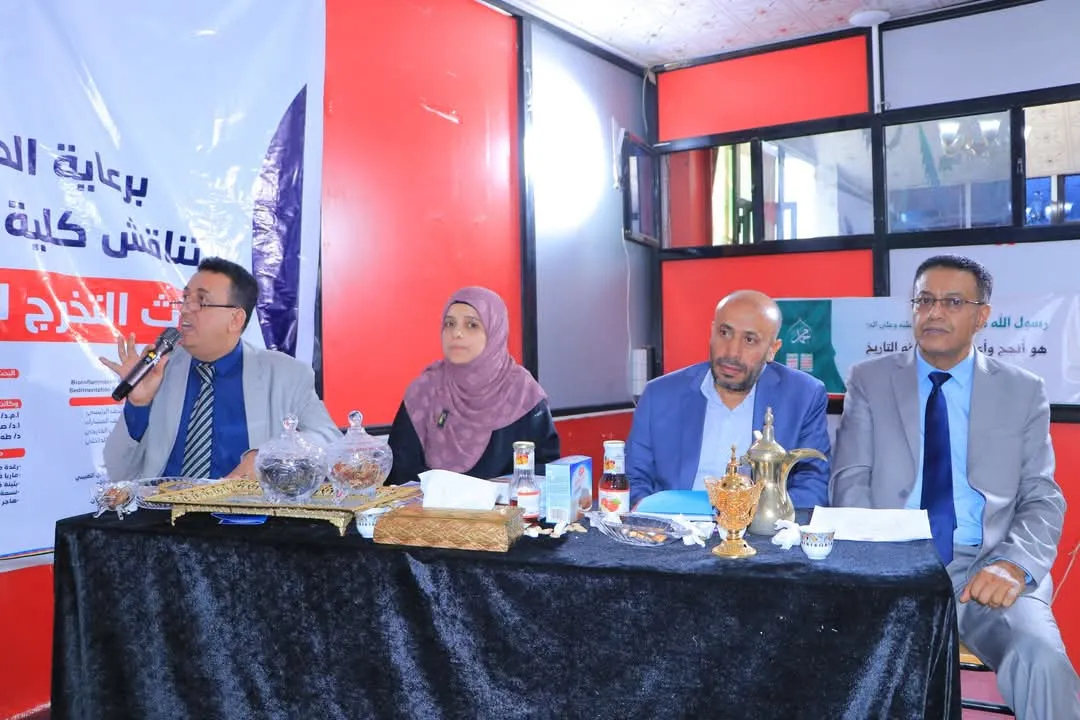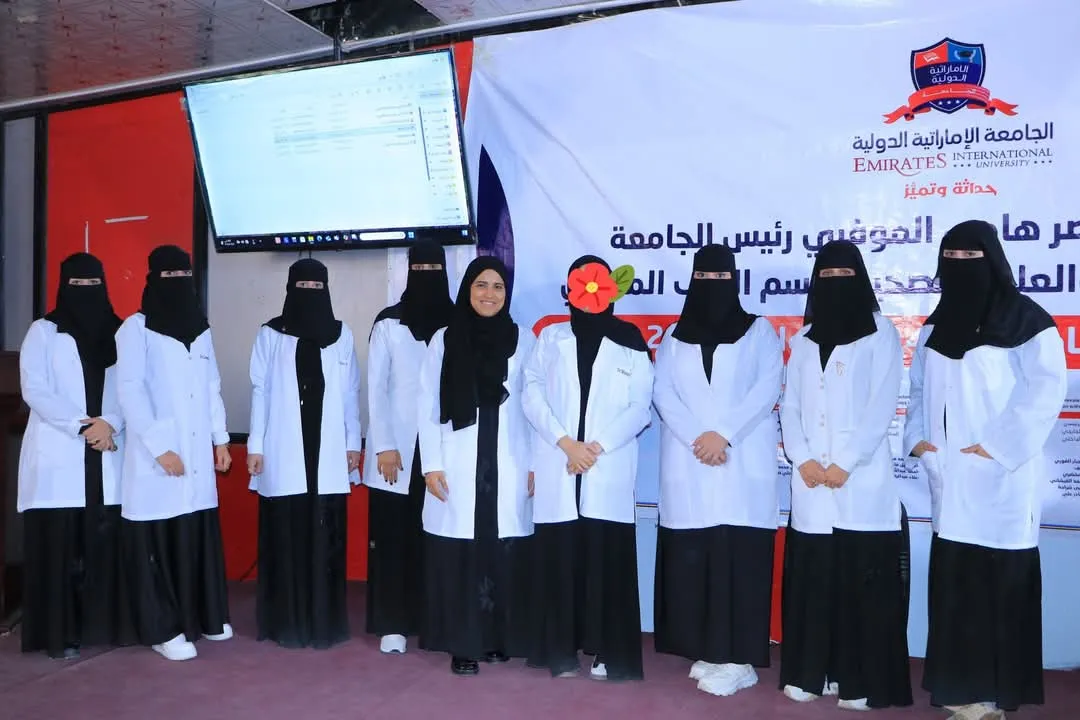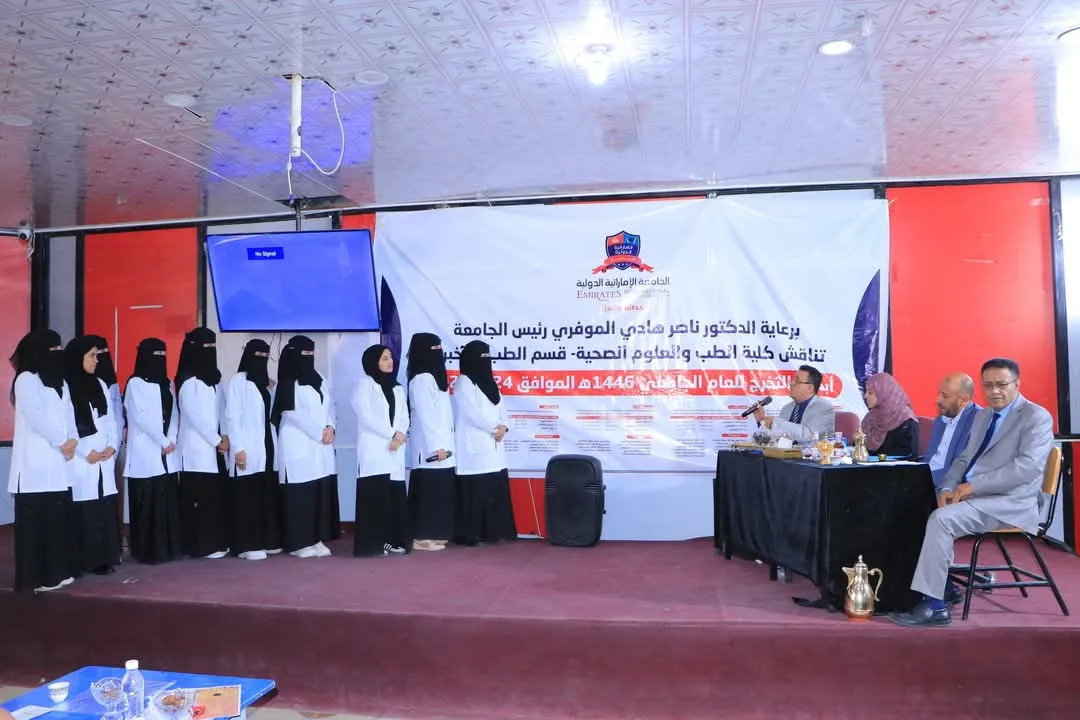
A research project by female students from the Department of Laboratory Medicine highlights the relationship between complement C3 and metabolic syndrome in Yemen.
University Media
In a scientific achievement that reflects the excellence of the Emirates International University's biomedical research output, a graduation project by female students from the Department of Medical Laboratory Sciences was discussed yesterday, Monday, under the title: "Inflammatory Biomarkers, Complement C3, White Blood Cells, and Erythrocyte Sedimentation Rate in Patients with Metabolic Syndrome - Sana'a, Yemen." The project was attended by a specialized academic committee.
The project was presented by a research team consisting of the following students:
Ikram Abdullah Abdul Karim Ahmed Al-Houthi, Afaf Ali Mansour Abdul Qawi Taher, Ghada Mohammed Hamoud Ali Saida, Manar Khaled Saeed Hamid Al-Aghbari, Noura Mohammed Ahmed Ahmed Razeh, Hana Ali Mohammed Al-Kumaim, Hajar Mohammed Abdullah Muqbil Al-Dhubaibi, Malak Ahmed Abdo Al-Adashi, Malak Fawaz Qasim Saeed Al-Banna, and Zainab Ali Ahmed Mohammed Ghazwan. Supervised by: Asst. Prof. Dr. Abdulbasit Al-Ghouri, Associate Professor, Principal Supervisor; and Dr. Balqis Al-Haribi, Assistant Professor, Co-Supervisor.
The examination committee consisted of: Asst. Prof. Dr. Abdulbasit Al-Ghouri, Associate Professor, Principal Supervisor; Dr. Balqis Al-Haribi, Assistant Professor, Co-Supervisor; Prof. Dr. Walid Al-Dabai, Professor, External Examiner; and Dr. Taha Al-Nasari, Assistant Professor, Internal Examiner.
Research Content and Importance:
The project addressed metabolic syndrome (MetS), a complex health condition that combines several metabolic disorders such as abdominal obesity, high blood pressure, and insulin resistance. The study aimed to explore the relationship between certain inflammatory biomarkers—most notably complement C3—and the risk factors associated with this syndrome.
The study was conducted on a sample of 152 patients in Sana'a City, using a rigorous scientific methodology that included advanced laboratory measurements and statistical analysis using SPSS, with a focus on the association of biomarkers with factors such as age, weight, and waist circumference.
Key Findings:
The study recorded a statistically significant association between complement C3 and several factors associated with metabolic syndrome, particularly among individuals aged 45–60 years, weighing 61–80 kg, and with a waist circumference greater than 100 cm.
Other indicators, such as white blood cell count and erythrocyte sedimentation rate, did not show significant statistical significance, reducing their diagnostic value in this context.
The study concluded that complement C3 represents a promising biomarker for monitoring low-grade chronic inflammation associated with metabolic syndrome.
Academic and Research Excellence:
This project highlights the depth of academic and research training received by students at the Emirates International University. It reflects the college's commitment to preparing qualified personnel who contribute to the development of scientific research and serve the community by addressing real and pressing health issues. It also confirms students' ability to produce high-quality scientific research based on precise methodologies and sound research standards.
The Emirates International University affirms its continued support for quality graduation projects and the encouragement of applied research that addresses the needs of Yemeni society and keeps pace with regional and international scientific and medical developments, positioning its graduates as highly qualified professionals in the labor market and research fields.
Website:
https://eiu.edu.ye
#Emirati_International_University
#Modernity_of_Distinction
#EIU



